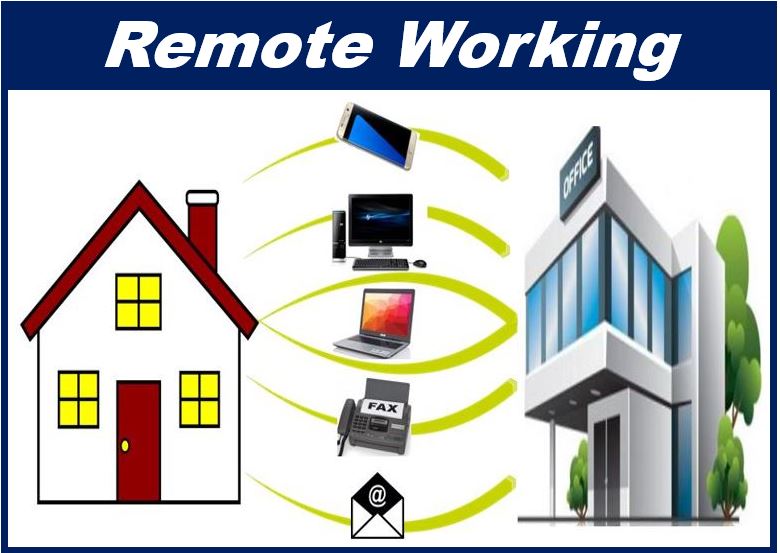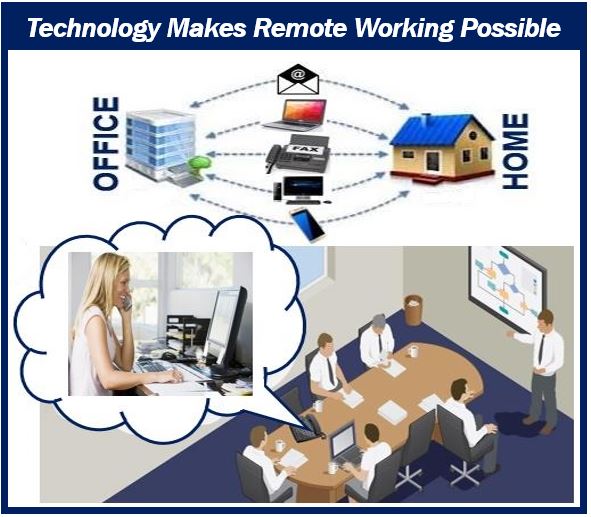Remote Working means working far from where your employer is located. For example, if you work at home but your employer’s offices are ten miles away, you are a remote worker.
In a remote working situation or arrangement, the worker does not commute or travel to an office building, warehouse, etc., he or she does not travel to a central workplace.

Synonyms of remote working
There are many terms that have the same meaning as remote working. Let’s have a look at some of them:
- Telecommuting.
- Teleworking.
- Work-from-Home (WFH).
- Home-based Work.
- Virtual Work.
- E-work (electronic work).
- Mobile Work.
- Distance Work.
- Off-site Work.
- Flexible Workplace.
- Cloud Working.
- Virtual Employment.
Remote working becoming more common
Since the advent of the Internet a few decades ago, how we work, study, play, spend our leisure time, communicate, and gather information has changed significantly.
Today, we can have video conferences, communicate by texting, mobile phones, and email. We can store our work in the cloud for colleagues and bosses to access and also work on.
Teamwork today does not require all members to be physically together. With modern technology, members of a team might be thousands of miles apart, but are able to function as one harmonious, synchronized unit.
This means that many employees can function just as effectively if they work remotely, i.e., at home.
According to the US Bureau of Labor Statistics, over 26 million Americans work remotely today either full time or part-time. This is approximately 16% of the country’s total workforce. In just one decade, from 2005 to 2015, the number of Americans involved in remote working grew by 115%.
The American Psychological Association says the following about people working remotely:
“Telecommuting arrangements can vary greatly for different workers. They can be fully or partially remote; they may work from a home office, co-working space or other location; and increasingly they may be geographically distant from the organization or clients they serve.”

Remote working successfully
If you want to function successfully as a teleworker, you need to have:
- A laptop or desktop computer.
- An email account.
- Access to a VoIP service such as Skype which has telephoning, teleconferencing, and videoconferencing technology (videoconferencing is not always necessary). VoIP stands for Voice over Internet Protocol.
- A smartphone.
- A fax machine (in some cases).
- A printer (in some cases).
Advantages for the employee and employer
Remote working offers several advantages for both employees and employers. Let’s have a look at some of them:
Benefits for the employer
- Lower office running costs. If people are working at home, your utility bills will be lower and you won’t need so much office space.
- Travel-related problems, such as public transport strikes, bad weather, or floods are less likely to disrupt work.
- Your talent pool for recruitment is much bigger. You are not limited just to people within commuting distance. In fact, you can employ anybody worldwide as long as they have an Internet connection and access to communication technology.
Benefits for the employee
- No more commuting.
- You don’t need to get up as early as your commuting colleagues do.
- Your work environment is familiar and comfortable.
- No travel costs.
- You have a better work-life balance.
- You are less likely to be the victim of workplace bullying or harassment.
Furthermore, remote working necessitates stringent digital security measures to protect sensitive data and maintain privacy, as employees access company resources from various networks.

What about office camaraderie?
If you are considering working at home, you need to be willing to give up some of the benefits of being with others in an office. You will meet your colleagues less often and you will have fewer opportunities to forget about personal problems with workplace banter or getting together with workmates for a drink at the end of the day.
If you are the only one who works remotely, you may eventually find yourself becoming the ‘outsider.’ Will you feel left out?
In a Market Business News article about teleworking, we made the following comment:
“If you prefer separating your personal life from work, teleworking may not be for you. Bear in mind that you will be spending considerably more time ‘immersed’ in your personal life.”
“A teleworker needs to be a self-motivated person. There will be nobody there motivating you to carry out your duties properly and on time. Are you that kind of person? Can you work successfully under your own steam?”
Coronavirus pandemic
During the coronavirus pandemic, millions of people began working remotely for the first time. Thanks to modern technology, this was possible, especially for office workers.
As the pandemic subsided, some employers allowed their workers to continue working from home, others offered a hybrid work schedule, and some insisted that everyone return to the office.
The trouble for those who wanted their staff back at the office, is that people grew to like remote working, and resisted. Although today fewer employees are working remotely compared to during the pandemic, a surprising number have continued working at home. Many of them say that they have no intention of commuting every day.
A new threat, however, is looming for millions of office employees and workers in various sectors of the economy. Over the last few years, employers have been adopting artificial intelligence (AI). Whether the threat of being replaced by AI will encourage people to return to the office, and whether that will make any difference to their employment outlook, remains to be seen.
When remote working is not possible
Remote working is not feasible for many jobs that require a physical presence, direct interaction with equipment, or hands-on services. Here are some examples:
- Surgeon – Requires being present in the operating room to perform surgeries. Possibly, in future, there may be avatar robots that do what the remote surgeon wants.
- Chef – Must work in a kitchen to prepare meals. If you go to a restaurant, you will not eat anything there if the chef tries to work from home.
- Police Officer – Needs to be on patrol or respond to incidents in person.
- Construction Worker – Must be on-site to build or repair structures.
- Farmer – Needs to be on the land to manage crops and livestock.
- Firefighter – Has to be present at emergency sites to combat fires and conduct rescues.
- Pharmacist – Often needs to be present in a pharmacy to dispense medication. However, some of the work can be done remotely. The sale of medications through the Internet via online pharmacies is growing rapidly.
- Electrician – Must go to various locations to install and repair electrical systems. If a building needs to be rewired, the electrician must be there physically to do the job.
- Veterinarian – Needs to interact directly with animals for treatment.
- Hairdresser/Barber – Must work in a salon to cut and style hair.
- Dentist – Requires being in an office to examine and treat patients’ dental issues. If you have a bad toothache, the dentist needs to be next to you to treat you properly. They cannot help you remotely.
